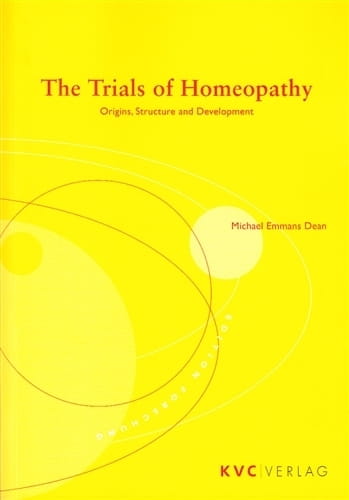Reprinted with the permission of The ARH (from 'Homeopathy in Practice' Journal, Winter 2004 edition). Reviewed by Dr Colin B Lessell.
The Trials of Homeopathy is the first systematic review of all the clinical trials of homeopathy from its beginnings to 1998, these having been predominantly carried out in Europe and North America. In this extraordinarily comprehensive and thorough work, the author successfully demonstrates that homeopathy has a 200-year history of clinical trials which have not received the recognition they deserve. In this regard, I must fully concur with the publishers in their statement: At a time when the place of homeopathy in a changing health landscape is under discussion, this work provides a valuable historical context. The current debate about the merits of different therapies is informed increasingly by trial evidence. The rediscovery of homeopathy's research tradition is, therefore, of particular importance. The background to this book is somewhat unusual. Originally written to obtain a PhD at the University of York, it was subsequently awarded the Hans Walz. Prize (by the Robert Bosch Foundation) in ' Germany for the best work on the history of homeopathy. Publication in its present form then proceeded rather hurriedly, the author not being allowed sufficient time to popularise the style of its content. As a result, although extremely well written, it sometimes appears to be rather academic and formal, retaining the character of all that the dons would have expected of a learned thesis. Under the circumstances, Dean must be fully forgiven for presenting some things a little indigestibly for the average reader, not least of all a few rather technical statistical matters. But, so what? It is, after all, the most thorough dissertation on this subject to date, one that could be proudly presented to any professional coven, and a monumental compilation of objective fact which few could achieve even in two lifetimes. Even beyond that, his historical notes, deductive comments and insights are well worth reading, placing it beyond a mere compendium of numbers and results. The title of the book, I believe, is deliberately. but appropriately, ambiguous. It can be taken to mean the clinical trials of homeopathy or the trials of homeopathy in the professional dock. Though the content is vast, Dean has successfully divided the book into four logical parts, with further divisions into enumerated chapters, a few of which are listed, and subchapters:
Part I: Homeopathy's place in the history of therapeutics (Chapters: Homeopathy and the progress of science'; Origin of Hahnemann's pharmacognosy and miasmatic theory; Homeopathy after Hahnemann)
Part II: Homeopathy and the development of clinical evaluation. A systematic review of clinical trials of homeopathy, 1821-1953 (Chapters: Why look at historical trials of homeopathy?; The earliest observational studies, 1821-35; Comparisons with allopathy, 1844-86; Placebo controls - in trials in practice, 1810-1920; Adoption of the biomedical research perspective, 1914-53)
Part III: Is homeopathy clinically relevant? A systematic review of clinical trials, 1940-98.
Part IV: Conclusion.
To this must be added the lengthy appendices, all contained in the accompanying CD, and consisting of a wealth of material deselected for inclusion in the main text.
I am quite sure that anyone reading this book will be convinced that homeopathy has not been idle in the pursuance of evidence-based medicine - more importantly, often with positive results. This book is a definite must for anyone involved in the teaching of homeopathy to others or those who are involved in the politics of its establishment within the general medical system, both at under- and postgraduate levels. Beyond that, anyone who has more than a passing interest in the history of this subject will find it a source of great fascination. Amongst other things, it effectively dispels the popular belief that homeopathy is great for minor conditions but useless for major ones. It was, after all, in the field of major illness that it first achieved its quantifiable therapeutic successes. Dean also discounts the alleged relationship of homeopathy with alchemical medicine, with the exception of certain pharmaceutical techniques introduced after 1816.
Although I fancy this book will never come to a second edition (for such are the economics of modern publishing), I can well envisage its future supplementation with further CDs as new developments emerge. All in all, a pivotal and significant work - and, rather surprisingly for one destined for the professional market, a few pounds cheaper than the average BBC cookbook!

